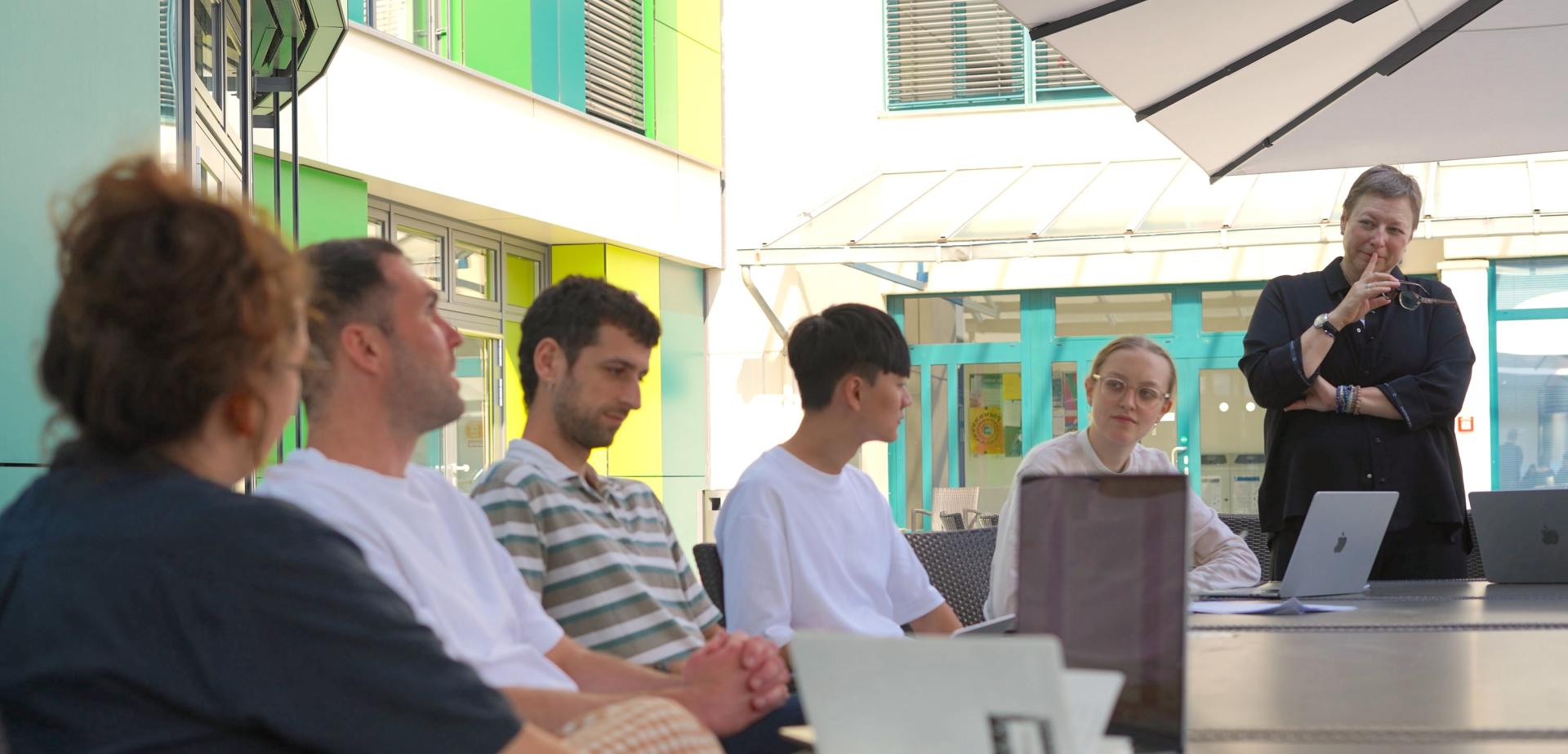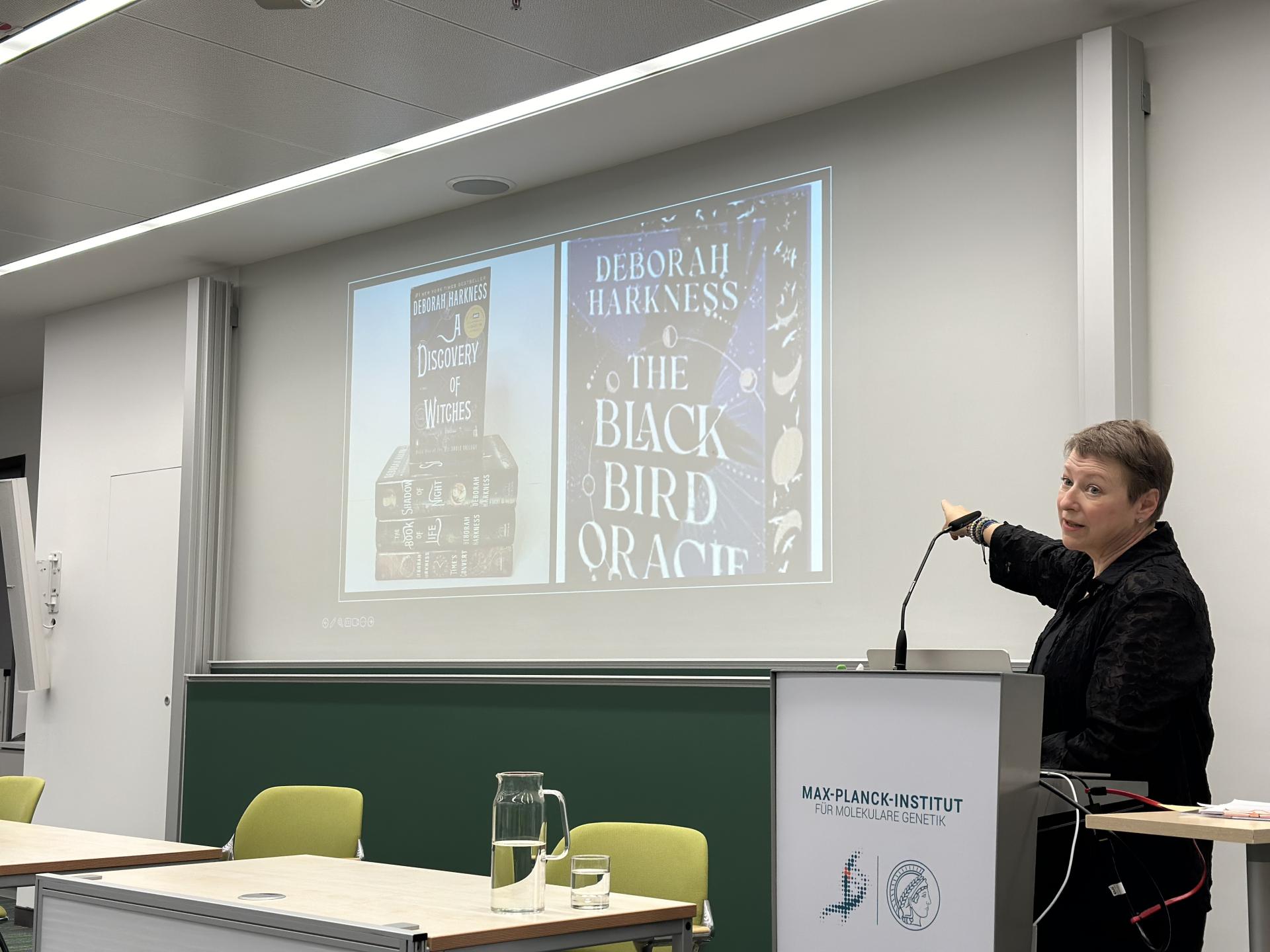Methods Intensive Master Class 2024 with Deborah Harkness: History as Writing, Writing as History
by Megan Rhian Briers and Dwirahmi Suryandari
Even before we began brainstorming potential ideas for the Methods Intensive Master Class 2024, the craft (and challenges) of writing history had been a frequent topic of discussion among the doctoral students at the IMPRS. The requirements of the IMPRS program encourage us to write early and often, with deadlines set already for the end of the first year. This is beneficial, but we still face questions regarding how we can and should translate our research into a written form. In light of this, we were thrilled to welcome Professor Deborah Harkness (College of Letters, Arts and Sciences, University of Southern California) to Berlin for a three-day IMPRS Master Class on “History as Writing, Writing as History” (17–19 September). Convened at the neighboring MPI for Molecular Genetics, the program featured one public lecture and two workshop days, “Plots, Characters, and Arguments: The Writer’s Craft” and “Attending to Audience.”
To prepare for the Master Class, Deborah assigned us a series of reading, including her published scholarly articles and fictional accounts. These were not as disparate as that might sound—the topic and characters covered in both were often the same! Discussing Deborah’s “fiction” writing alongside more classically “academic” journal articles was revelatory and gave us an intimate glimpse of the meticulous research that goes into the plot and characters found in the fiction. Deborah’s approach is to “show,” not “tell” the reader—allowing her to weave her historical research subtly into her fiction writing. The skill this requires was evident in the public lecture that kick-started the workshop. Deborah described the incredible amount of work involved in producing historical dramas for TV. A wide range of skilled professionals collaborate to ensure the depictions reflect the historical sources and our understanding of the period. The diverse representations of historical material that we discussed in the workshop showed us to how meanings assigned to people and events are necessarily impacted by medium and genre.
Guiding us through writing exercises, Deborah encouraged each of us to take a bird’s eye view on our PhD projects and to articulate our personal motivations and ideal target audiences. We also spent time brainstorming the constitutive sections of a final dissertation—noting how much expectations vary between academic systems, subdisciplines, and supervisors. Having international scholars at various career stages in the workshop was useful to flesh out the differences between the German and American systems. Talking about writing both the dissertation and the later book, Deborah highlighted the importance of opening up our methodology to our readers by explaining the archival work and challenges underlying the research process.
Deborah also offered useful and practical writing tips—very welcome as we all continue to work towards producing new chapters. She advised starting with questions, an approach that pushes us to seek answers and explore rather than becoming confined to a single argument. On finding the time to write, Deborah emphasized the importance of setting aside time for writing. A short period is fine, as long as it is regular. She noted that the process of thinking is also part of the writing process—it just takes place in our minds as opposed to on the page.
Making the most of the sunny weather, the post-workshop garden party gave us a further opportunity to collectively bond over both our moments of joy and our struggles with the writing process. Throughout the Master Class, we were able to gain a privileged insight into Deborah’s craft and learn ways to apply her innovative practices to our future work. In particular, the opportunity to engage with different forms of historical writing—from academic texts to fiction and television—encouraged us to think about alternative ways of communicating history. As young researchers in today’s world, we believe that developing the ability to reach broader publics is an important skill, helping to ensure that our scholarship becomes vibrant, relevant, and impactful.
-------------------------------------------------------------------------------------------------------
Deborah Harkness is a historian of science and medicine from antiquity to the present. A specialist in the period from 1400–1700, she is fascinated by how the study of the natural world traveled from the universities of the Middle Ages, through the libraries and royal courts of the Renaissance, into the cities and homes of early modern Europe, and then finally arrived in the learned academies of the Enlightenment. Rather than focusing on the end-points of this journey (the medieval university and the enlightened scientific academy), she studies the many spaces that students of nature passed through along the way in search of an ideal place to do scientific work. She is the award-winning author of John Dee’s Conversations with Angels: Cabala, Alchemy, and the End of Nature (1999) and The Jewel House: Elizabethan London and the Scientific Revolution (2007), as well as the All Souls trilogy, which has been translated into 37 languages and produced as a television mini-series for which she is an executive producer.
The IMPRS's Methods Intensive Master Class offers a forum where participants from a spectrum of disciplines can critically compare, confront, and combine their specific methodological skills and training. The history of science has developed into a multidisciplinary field studying artifacts, practices, action, and knowledge that brings together a multitude of scholars with different methodological skills and preferences. The Methods Intensive Master Class series mobilizes that methodological diversity as a reflexive tool for assessing the current state of the discipline and its cross-disciplinary potential. With every season, the series deepens our learning journey as we navigate questions concerning the essential characteristics of the history of science and knowledge: Which topics are of interest for historians of science, and which methods do they customarily draw upon? What methods are we currently using to investigate the making of knowledge? What are the exemplary studies? How can the effectiveness of different methods be assessed? Ongoing reflection and exploration of research methods, established and cutting-edge alike, are vital to enriching the research capacities of future historians.
For information on past Methods Intensive Master Class activities before the launch of the IMPRS in 2022, please click here.
To read about Methods Intensive Master Classes offered since 2022, please click here.

